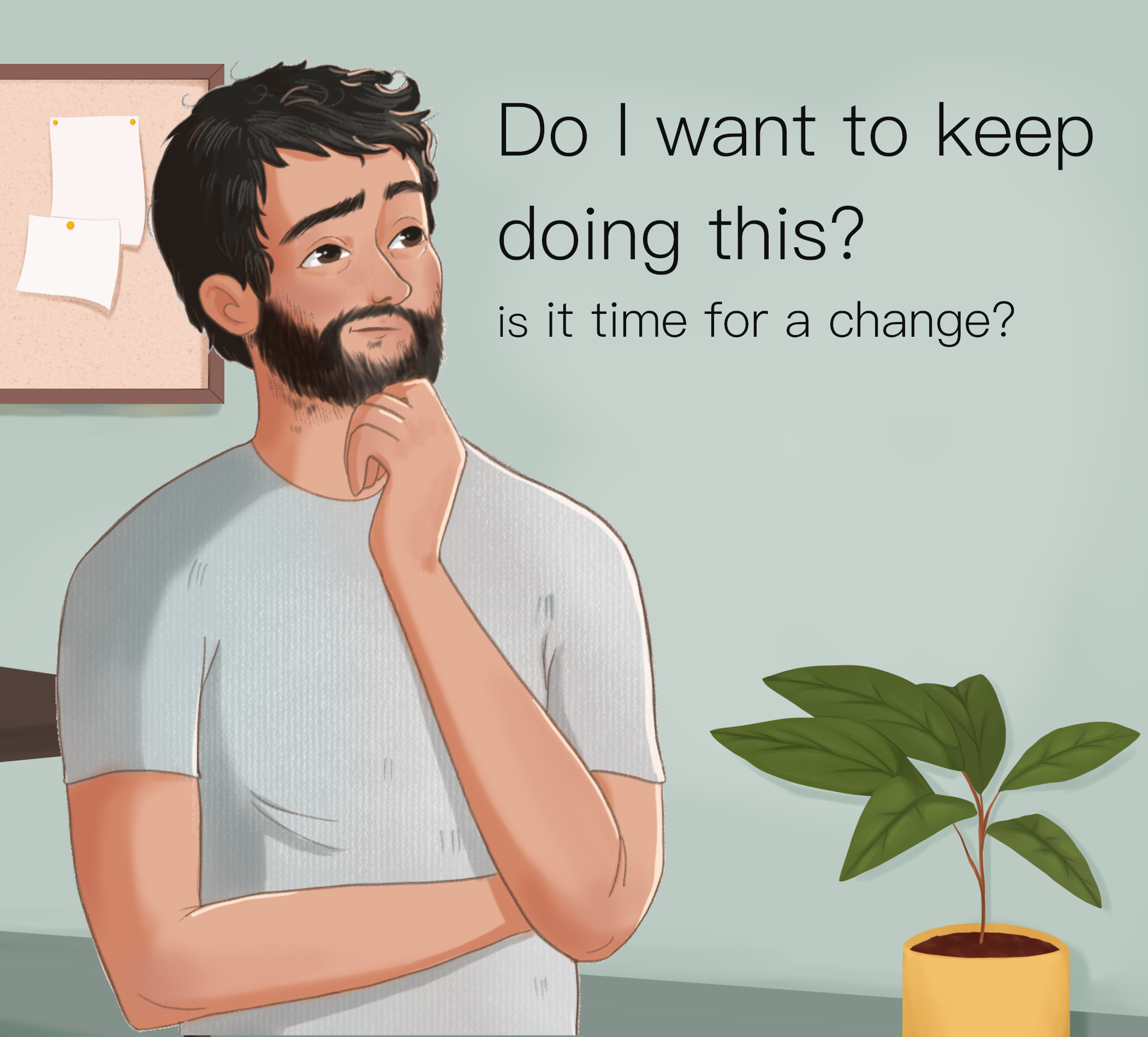Yet again you put off writing your resignation letter. Who are you kidding? Drop everything to learn to code? Now?
"Another time", you mutter. Closing shut the laptop screen.
This is a high stakes game.
You risk losing the financial security that comes with a job over an idea that might not even work.
Believe me, I know how it feels as it's a move I've made myself.
There are two approaches to learning code when you have an existing job.
- Staying in your current job and learn during your free time.
- Quit.
This article is about the second - packing it all in to stare your new fate in the face.
Why would any anyone be crazy enough to quit their job and throw themselves into learning something as hard as code?

You'll Have More Time
Wake up. Shower. Commute. Gossip at the coffee machine.
Work can be time consuming, and it's not always spent productively.
Quitting your job gives you the chance to organize your learning around your highest and best energy levels.
Research led by psychologist K. Anders Ericsson, found that we have a window of about four to five hours a day where we're able to focus best.
Dedicating that time to the craft of learning to code might be the way forward if you feel too tired to get anything done in the evenings.
A Temporary Sacrifice Towards Securing a More Lucrative and Long-Lasting job.
When you think of it, how secure are any of our jobs today? Including the one you're currently in.
Most of us have parents who never considered quitting their jobs. The skills they obtained through their education were enough to keep that one job until they retire.
Today, however, jobs and skill sets are evolving at a mind-blowing rate.
The World Economic Forum predicts that by 2025 around 40 % of the current workforce will undergo some kind of reskilling training. Another 85 million jobs may be displaced as a result of the AI advancement.
For existing developers, however, [the Stack Overflow Developer Survey](the Stack Overflow Developer Survey) shows that most developers are happy with their jobs and 83% of them said that they are either not actively looking, or are not interested in new job opportunities.
It's no secret that coding pays well.
The temporary loss in income could be regained in the long term when you secure a much better paid role in software development.

You Have Everything To Lose
This is going to sound morbid, but bear with me!
You've left your job and everything that entails, from your standing in society to the halt in your income.
That's a scary prospect, but also a very powerful motivator.
Because of this fear, we cling to the job we've got.. even when we are extremely unhappy with it.
Unfortunately, this leads us to become complacent and restrict our growth potential.
Even if we are chasing a promotions, we are competing with colleagues often with your same skill set and the promotion doesn't entail much in the way of personal growth.
Learning a new skill means breaking free and starting afresh.
"A good shock often helps the brain that has been atrophied by habit." Napoleon Hill
When leaving your job, failure simply is not an option. But that might be what it takes for you to change your current circumstances for the better.
“It is demand that brings out the exceptional qualities of man. I think the ability of the average man could be doubled if it were demanded, if the situation demanded.” Will Durant
But wait! Don’t do anything without these important considerations
No Way Back
Keep in mind that this is the nuclear option.
Carefully weigh up the pros and cons before doing anything drastic.
You will be burning bridges and there will be no going back.
You will need to come up with a valid reason for the hiatus if learning to code doesn't work out.
Global Economy
Although the demand for developers trends increasingly upwards in the years to come, this may be slowed from time to time by the state of the economy.
The economy almost always bounces back but a recession may affect your chances of quickly landing a role.
If you succeed at learning to code, you may be industry-ready in as little 3 months via a bootcamp or roughly 6-9 months self-taught. Add another 3 months on top of that for the job search.
(Check out this article for a more in depth learning code time line)
Recessions, however, tend to last around a year or two before the next bull market.
Therefore, it may pay to hold onto your job at least until the outlook improves, particularly if your financial situation is precarious.
Is This Definitely For You?
Learning to code is a challenging and technical endeavor.
Are you sure you're not going into this for superficial reasons, but rather to indulge a genuine passion? Don't neglect the fact you'll also need
Learning full-time isn't necessarily a guarantee you'll progress faster. Work gives you structure and you'll need to organize your day against a robust new routine.
You need to be honest with yourself and also figure out whether you are sufficiently disciplined to use the new found time to genuinely knuckle down and manage distractions.
Can You Compromise?
Is there anything in your life that might offer you some you some additional flexibility?
Rather than leaving outright, could you potentially ask for less hours? Alternatively, could you take on a part time role? I've even had students that were driving Uber part time.
Could you hold on just a little longer in your role to save some money and keep you afloat.
And if you do quit employment, other options could include moving back home with parents to save money. If you live with a partner, could you convince them to support you for the short term?
The point being to examine all opportunities before making the jump, including your back up strategy.
Conclusion
Be smart. This is high risk, high reward.
You could potentially learn to code significantly faster. I've seen people leave everything behind and succeed in changing their lives.
But take time to think it over, even months, to consume as much information as possible.
Ultimately, only you know your situation the best and no article can responsibly encourage you to take a life-changing decision without full context. Keep a sceptical eye on the content you do consume.
If you still can't decide, I'd recommend finding gaps in your schedule to dabble. Once you feel capable and certain that this is what you want, you can take more drastic decisions.
But remember, if you don't start in any way you can, you'll never know what you can become.